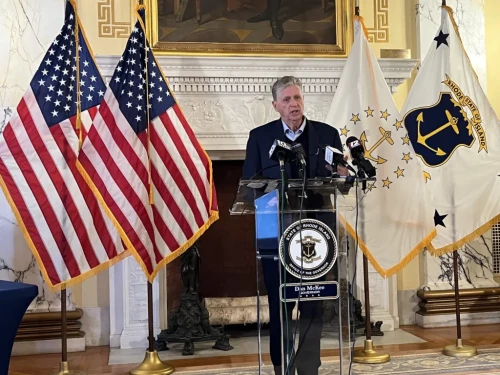“I been fightin’ mentally/All these voices in my head be messin’ with my energy.” Hundi, a member of AS220 Youth, opened his verse with this powerful line. “It’s like therapy, and it’s like a way of coping and connecting with other people,” he explained. “When you’re making music you can say how you’re feeling in that moment and it can resonate with people.”
On this day the class was tasked with a special assignment from their instructor and mentor, Jay Lew. “I really want you all to focus in thinking about the idea of how mental health and your music comes together.” It’s a simple, yet impactful, assignment. Jay Lew’s student Qbando was up for the challenge. “Once I heard that we had to write about mental health, it just like clicked because, as a man, we really don’t talk about our mental health for real.”
Writing about such personal topics can be intimidating. The participants at AS220 Youth have built enough of a rapport with one another, making it easier to share their feelings with their peers. “It is more than just coming here to do your art. It’s like a support system,” Hundi told us. “It’s more of a home for people who want to come express themselves. They don’t want nobody feeling like they’re nothing and left out, we’re here to expand and grow.”
As much as music can be about self-healing, Hundi explains how there is a communal aspect to it all. “Hopefully, it resonates with the listeners. I just want them to hear me out and resonate with it. Make people feel better about the feeling.” Qbando echoed his classmate’s sentiment. “Music brought me out of my box,” he said. “Music is my comfort space, literally. I usually don’t open up with anybody.”
“Ever since I lost my Aunties I ain’t never been the same/And it’s always long live JB, that one hit me like a train/And I pray for better days.” Qbando’s verse revealed his experience with pain and loss, but his message in the end was one of hope: “I know God can heal my pain/Had to take that to the grain/I’m out the way to make a change/So I stay in my own lane to show my Mama better days.” Understanding the importance of opening up, Qbando explained the inspiration for his verse to us. “I really gotta show them the grit and grind behind my music. And show people that if you’re not feeling good, another person could feel just like you.”
This story is part of our Finding Hope Project. Finding Hope is generously sponsored by Blue Cross & Blue Shield of Rhode Island. Blue Cross & Blue Shield of Rhode Island is an independent licensee of the Blue Cross & Blue Shield Association.








